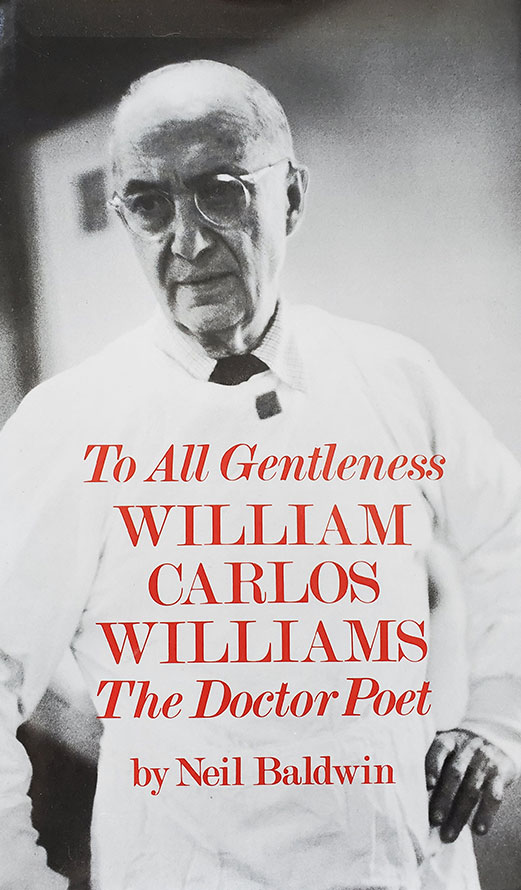To All Gentleness: William Carlos Williams, the Doctor Poet
“…a deftly-written portrait. Neil Baldwin shows us a man who found joy in the noises of daily life, and who put poetry together ‘with as much painstaking care as he took in the delivery of a new baby.’”
– Susan Stamberg, The New York Times Book Review

Neil Baldwin believes that William Carlos Williams (1883-1963) is still the great standard-bearer of the modern American poetic tradition – and, furthermore, possesses the vitality to speak with enduring power to the millennial generation: “I first got into Williams’ poetry in my early twenties,” Baldwin recalled. “He was so accessible, so full of life. His down to earth language and sheer humanity made such a vivid impression upon me that I went on to write my doctoral dissertation as a descriptive catalogue of all of Williams’ manuscripts and letters in the poetry collection at SUNY/Buffalo, as well as at Yale’s Beinecke Library.” The catalogue, with a preface by the late Robert Creeley, was published in 1978, and is the definitive resource for access to Williams’ vast archives.
Baldwin’s biography of Williams, To All Gentleness, originally published by Atheneum in 1984, was the first in his succession of major published works of nonfiction and biography spanning the ensuing decades, from Man Ray to Thomas Edison to Henry Ford; most recently, Baldwin’s The American Revelation (St. Martin’s Press), was selected by the Chicago Tribune and the Wall Street Journal as one of the best nonfiction titles of 2005.
“Last spring, I realized that 2008 would mark the 125th anniversary of Williams’ birth,” Baldwin said. “Of course, the author must have a compelling subject; but timing is likewise critical in the crowded field of trade publishing. What better moment could there be to shine a renewed spotlight on Williams’ work? I immediately thought of Black Classic Press: For thirty years they’ve kept great books in print. I spoke with Paul Coates, the founder, and a long-time friend, and the timing was perfect. They were in the process of expanding their publishing beyond African American titles with their INPRINT EDITIONS imprint.”
Coates happily agreed with Baldwin’s faith in their synergy. “Working with Neil on publishing To All Gentleness is special,” says Coates. “First and foremost, we get to publish and keep available an excellent biography on Williams. At the same time, we get to work with Neil, whose extensive knowledge of poetry and writing helps guide us in an area we haven’t published in before.”
William Carlos Williams, M.D., was born, practiced medicine, and died in the small town of Rutherford, New Jersey, nine miles west of Manhattan – the great metropolis where he sought weekend respite from the round-the-clock demands of his family practice. For fifty years, Williams ricocheted back and forth, from 3 a.m. house calls to art gallery openings; from visits to immigrant poor that paid him with farm produce to “little magazine” editorial board meetings; from taping the sprained ankles of the local high school football players to listening to late-night jazz in Greenwich Village clubs. Driven by an insatiable energy and the desire – as his lifelong friend Ezra Pound preached – to “Make it new,” scribbling hurried first drafts on prescription pads, Williams managed to produce more than forty books. Beyond the condensed, impressionistic, open-formed verse for which he is renowned, he churned out dozens of short stories, plays, essays, and a trilogy of novels. The wave of Williams’ life’s work crested in the ambitious epic Paterson, an attempt “to bring the whole knowable world into the province of the poem,” that remained unfinished at his death.
How does William Carlos Williams speak to us today? Baldwin says that “his work touches us on two major levels. First, the historical and cultural moment we are living through now. America seeks to regain and re-establish our sense of self-definition. Williams was steadfast in his belief in American values exemplified by an American language that glorified individuality, resourcefulness, and, yes – charity. Williams cared for those less fortunate because that was his profession and they were his patients; he also cared about the disenfranchised. And second, for today’s young people, Williams’ voice resounds with refreshing faith in the importance of everyday experience. Your life can be full and rich and meaningful if you know where to look, and the best place to start is at home, in your own backyard, with the people, places, and things you know best.” – by Natalie Stokes and W. Paul Coates. Black Classic Press, Baltimore, Maryland.
Buy at Amazon | Bookshop.org